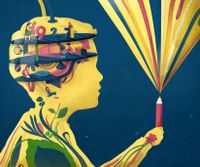Why Ages 2-7 Matter So Much for Brain Development
Rich experiences—from play to the arts and relationships—fundamentally shape a young child’s development.

When Albert Einstein was a child, few people—if any—anticipated the remarkable contributions he would make to science. His language development was delayed, worrying his parents to the point of consulting a doctor. His sister once confessed that Einstein “had such difficulty with language that those around him feared he would never learn.” How did this child go from potential developmental delays to becoming, well, Einstein?
Part of the answer to that question is symbolized in two gifts that Einstein received from each of his parents when he was 5 years old. When Einstein was in bed all day from an illness, his father gave him a compass. For Einstein, it was a mysterious device that sparked his curiosity in science. Soon after, Einstein’s mother, who was a talented pianist, gave Einstein a violin. These two gifts challenged Einstein’s brain in distinctive ways at just the right time.
Children’s brains develop in spurts called critical periods. The first occurs around age 2, with a second one occurring during adolescence. At the start of these periods, the number of connections (synapses) between brain cells (neurons) doubles. Two-year-olds have twice as many synapses as adults. Because these connections between brain cells are where learning occurs, twice as many synapses enable the brain to learn faster than at any other time of life. Therefore, children’s experiences in this phase have lasting effects on their development.
This first critical period of brain development begins around age 2 and concludes around age 7. It provides a prime opportunity to lay the foundation for a holistic education for children. Four ways to maximize this critical period include encouraging a love of learning, focusing on breadth instead of depth, paying attention to emotional intelligence, and not treating young children’s education as merely a precursor to “real” learning.
ENCOURAGE A LOVE OF LEARNING
Young children need to enjoy the process of learning instead of focusing on performance. Educators and parents can emphasize the joys of trying new activities and learning something novel. We need to help children understand that mistakes are a welcome, normal part of learning.
This period is also the time to establish a growth mindset—the belief that talents and abilities are developed through effort instead of being innately fixed. Educators should avoid labeling children or making universal statements about their ability. Even compliments such as “You’re so smart” are counterproductive. Instead, emphasize persistence and create safe spaces for learning. Children will learn to love learning if we show enthusiasm over the process rather than fixating on results.
FOCUS ON BREADTH, NOT DEPTH
One way to avoid focusing on results during this phase of development is to emphasize the breadth of skill development over depth. Exposing children to a wide variety of activities lays a foundation for developing skills in a range of fields. This is the time to engage children in music, reading, sports, math, art, science, and languages.
In his book Range, David Epstein argues that breadth of experience is often overlooked and underappreciated. Focusing on excellence in a single activity may be appropriate at some point in life. But the people who thrive in our rapidly changing world are those who first learn how to draw from multiple fields and think creatively and abstractly. In other words, our society needs well-rounded individuals.
Continue reading article here: https://www.edutopia.org/article/why-ages-2-7-matter-so-much-brain-development
Category: News







